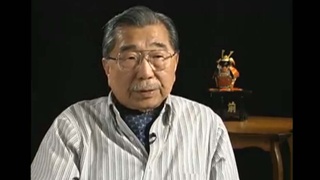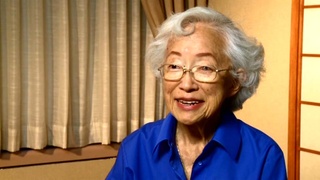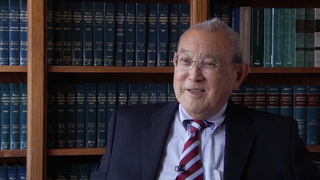Interviews
Asian Stereotypes
The stereotyping of people, specifically Japanese Americans, or the Japanese, I think, has played a powerful role in shaping who we are, and what we have become. And what we will be.
When Asians first started coming to the United States, they had discrimination from the outset. Immigrants coming from Asia could not become naturalized. So they were, by law, made foreigners in this country. And the Alien Land Law was passed, which denied land acquisition for, the term was, “Aliens ineligible for citizenship,” which meant Asians. But the word Asians wasn't used.
These laws, and these attitudes, were based on stereotypes that they had of Asians. And those stereotypes were reinforced by the stage plays at that time, by the newspaper cartoons at that time. And as society and the media grew, it became a part of the movies and part of songs stereotyping Asians. Stage plays that stereotyped Asians. And so when internment came down, it was those stereotypes that contributed to the hysteria of getting rid of the Japs from the west coast. During the war time, Chinese played the roles of Japanese. Those stereotypes. Asians rented out our faces to contribute to the maintenance of that stereotype. These stereotypes were created by whites that had no understanding of who we were as people. It was their vision of us, colored by the politics of that time. We contributed our faces to that.
But now things are changing. We have filmmakers now, who are Asian American. Writers. Producers. Directors, who are Asian Americans. As well as actors, who are Asian Americans. We are now telling our story from our perspective, in our voices, with our faces. And the faces are rooted in their genuine experiences. So we've made tremendous progress. We have television series now that depict Asian families. I haven't seen it yet, but I'm looking forward to Fresh Off the Boat. I have a couple of friends on that series. So we're making great progress. We need to now develop what I think are Asian American bankable stars, so that feature films now can be told from our perspective, in our voices.
Date: February 3, 2015
Location: California, US
Interviewer: John Esaki, Janice Tanaka
Contributed by: Watase Media Arts Center, Japanese American National Museum
Explore More Videos


Avoiding the pigeonhole of stereotypes during school years
(b. 1955) Lawyer

Thoughts on relationship between Japanese Peruvians and Japanese Americans at Crystal City, Texas
(1937 - 2021) Teacher

Father interrogated by FBI, but not taken away
(1925 - 2018) Nisei educator from Hawai‘i

The political effects on Nikkei during the war (Spanish)
(b. 1950) Nisei Chilean, Businessman

Government sold Japanese Canadian properties for little money
(b. 1928) Doctor. Former Chair of the Japanese Canadian Redress Foundation.

Questioning Curfew
(1918-2012) Fought the constitutionality of Executive Order 9066.

Challenges of finding a summer job
Judge, only Japanese American to serve on CWRIC.



Traumatic experiences before camp
(1913-2013) Doctor specializing in obstetrics in Southern California

“Everybody went in like sheep”
(1913-2013) Doctor specializing in obstetrics in Southern California

Discrimination for Nisei doctors
(1928–2016) Daughter of an Issei doctor


Being Denied as a Japanese American Lawyer
(b. 1934) The First Japanese American Appointed to the U.S. Court of Appeals.
